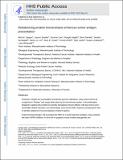| dc.contributor.author | Jaeger, Alex M. | |
| dc.contributor.author | Stopfer, Lauren Elizabeth | |
| dc.contributor.author | Lee, Sunmin | |
| dc.contributor.author | Gaglia, Giorgio | |
| dc.contributor.author | Sandel, Demi | |
| dc.contributor.author | Santagata, Sandro | |
| dc.contributor.author | Lin, Nancy U. | |
| dc.contributor.author | Trepel, Jane B. | |
| dc.contributor.author | White, Forest M. | |
| dc.contributor.author | Jacks, Tyler E | |
| dc.contributor.author | Lindquist, Susan | |
| dc.contributor.author | Whitesell, Luke | |
| dc.date.accessioned | 2020-05-29T15:21:37Z | |
| dc.date.available | 2020-05-29T15:21:37Z | |
| dc.date.issued | 2019-06 | |
| dc.date.submitted | 2019-04 | |
| dc.identifier.issn | 1078-0432 | |
| dc.identifier.issn | 1557-3265 | |
| dc.identifier.uri | https://hdl.handle.net/1721.1/125581 | |
| dc.description.abstract | Purpose: Despite the accumulation of extensive genomic alterations, many cancers fail to be recognized as "foreign" and escape destruction by the host immune system. Immunotherapies designed to address this problem by directly stimulating immune effector cells have led to some remarkable clinical outcomes, but unfortunately, most cancers fail to respond, prompting the need to identify additional immunomodulatory treatment options. Experimental Design: We elucidated the effect of a novel treatment paradigm using sustained, low-dose HSP90 inhibition in vitro and in syngeneic mouse models using genetic and pharmacologic tools. Profiling of treatment-associated tumor cell antigens was performed using immunoprecipitation followed by peptide mass spectrometry. Results: We show that sustained, low-level inhibition of HSP90 both amplifies and diversifies the antigenic repertoire presented by tumor cells onMHC-Imolecules through an IFNgindependent mechanism. In stark contrast, we find that acute, high-dose exposure to HSP90 inhibitors, the only approach studied in the clinic to date, is broadly immunosuppressive in cell culture and in patients with cancer. In mice, chronic nonheat shock-inducing HSP90 inhibition slowed progression of coloncancerimplants, but only in syngeneic animals with intact immune function. Addition of a single dose of nonspecific immune adjuvant to the regimen dramatically increased efficacy, curing a subset of mice receiving combination therapy. Conclusions: These highly translatable observations support reconsideration of the most effective strategy for targeting HSP90 to treat cancers and suggest a practical approach to repurposing current orally bioavailable HSP90 inhibitors as a new immunotherapeutic strategy. | en_US |
| dc.description.sponsorship | National Institutes of Health (Grant P30-CA14051) | en_US |
| dc.language.iso | en | |
| dc.publisher | American Association for Cancer Research (AACR) | en_US |
| dc.relation.isversionof | http://dx.doi.org/10.1158/1078-0432.ccr-19-0596 | en_US |
| dc.rights | Creative Commons Attribution-Noncommercial-Share Alike | en_US |
| dc.rights.uri | http://creativecommons.org/licenses/by-nc-sa/4.0/ | en_US |
| dc.source | PMC | en_US |
| dc.title | Rebalancing Protein Homeostasis Enhances Tumor Antigen Presentation | en_US |
| dc.type | Article | en_US |
| dc.identifier.citation | Jaeger, Alex M. et al. "Rebalancing Protein Homeostasis Enhances Tumor Antigen Presentation." Clinical Cancer Research 25, 21 (June 2019): 6392-6405 © 2019 American Association for Cancer Research | en_US |
| dc.contributor.department | Massachusetts Institute of Technology. Department of Biological Engineering | en_US |
| dc.contributor.department | Koch Institute for Integrative Cancer Research at MIT | en_US |
| dc.relation.journal | Clinical Cancer Research | en_US |
| dc.eprint.version | Author's final manuscript | en_US |
| dc.type.uri | http://purl.org/eprint/type/JournalArticle | en_US |
| eprint.status | http://purl.org/eprint/status/PeerReviewed | en_US |
| dc.date.updated | 2020-05-11T15:44:01Z | |
| dspace.date.submission | 2020-05-11T15:44:04Z | |
| mit.journal.volume | 25 | en_US |
| mit.journal.issue | 21 | en_US |
| mit.license | OPEN_ACCESS_POLICY | |
| mit.metadata.status | Complete | |
